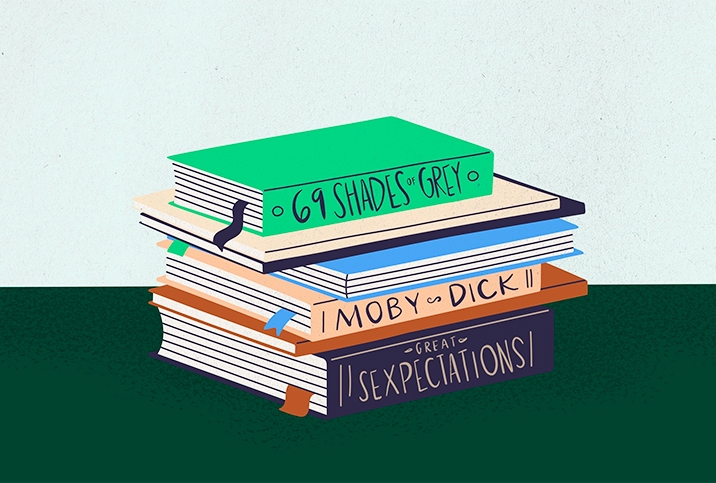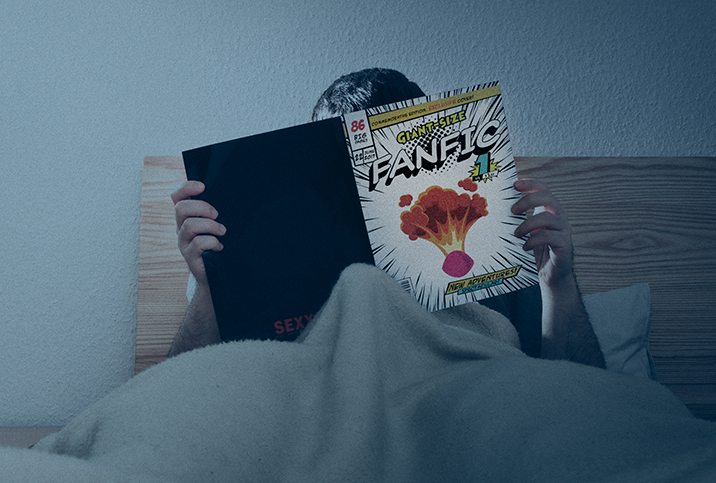Can Erotic Fan Fiction Supplement Sex Ed?

When a film or book franchise builds a big enough fanbase, there's a certain type of tribute that's guaranteed to follow: erotic fan fiction. If you're a "Star Wars" fan who has always harbored a crush on Luke, there's enough Skywalker smut out there to last you a lifetime.
While erotic fanfic is typically an underground form of entertainment, circulating mostly through whisper networks of writers and internet message boards, some of it does occasionally escape to the mainstream. Even "Fifty Shades of Grey" was envisioned as "Twilight" fan fiction before going on to become a blockbuster franchise of its own.
But beyond entertainment, erotic fan fiction is also a de facto educational tool, helping readers to imagine attractions, relationship dynamics, and other experiences of love and sex that are marginalized by society. This is of particular value for teens and young adults, who may have few sexual experiences but a growing awareness of their desires.
Early awakenings
In the early 2010s, I myself was in that awkward phase of early adulthood—old enough to be having sex, but still too young to know how to make it good. As a pubescent kid, the grown-ups around me had gone out of their way to teach me the physics and biology of baby-making, as part of their frantic efforts to prevent that outcome.
But no one ever offered guidance on the rest of it, such as navigating romantic relationships, exchanging consent and exploring queerness. At least, not in the real world, anyway. Social media was another story, and one platform in particular consistently generated the content that filled in the blanks.
Ten years ago, Tumblr was a unique platform with multimedia capabilities, simple sharing tools and relaxed terms of service. All of this easily attracted artists who were seeking a safe haven online to express themselves in ways too risqué for other social media platforms, such as Facebook. The result was a proliferation of porn gifs, hentai, nude selfies and, especially, erotic fan fiction.
In those days, you couldn't scroll the dashboard for more than 10 minutes before an illustration of Sherlock Holmes and John Watson kissing and cuddling would appear. For Kate Sloan, author of "101 Kinky Things Even You Can Do," that particular fanfic pairing played an essential role in her realization that she was kinky. When Sloan first discovered BBC's "Sherlock," she had no idea that it was one of the biggest fandoms on Archive of Our Own, a nonprofit fan fiction archive that includes more than 8 million works. After falling in love with the BBC show, Sloan began to explore the extensive fan fiction based on that world.
Though she had read erotic fan fiction while she was growing up, usually lesbian erotica on Tumblr, this time was different. Instead of merely reflecting her sexual desires back to her, "Sherlock" fanfic was apparently awakening new ones within her.
"I started reading fanfic stories where Sherlock was a cold, calculating, but ultimately caring dominant, and John was a smitten, hapless submissive," recalled Sloan. "The writing [was] engrossing, so that I was able to actually check in with myself and notice I was getting excited and aroused at the thought of submitting to someone like John was doing for Sherlock in the stories."
Sloan's familiarity with the source material was essential to her enjoyment of that fanfic, as it allowed her to picture the characters and settings without expending much mental energy. That familiarity also shielded her from shame as she explored kink for the first time, which still felt steeped in taboo back when she was in her early 20s.
"I always had the psychological protection of knowing I was reading about what fictional characters were into, not necessarily what I myself was into," said Sloan.
Healing and discovery
It turns out, "Sherlock" fan fiction doesn't have to be erotic to help someone sort out their sexuality. When Ashley O'Mara, an English Ph.D. candidate at Syracuse University who studies Shakespeare and queer asexuality, first began learning about the asexual spectrum, they were already aware that "Sherlock" had been adopted as the ace representation by that community.
What they didn't anticipate is just how much they would relate to the fanfic that the community was creating. "Once I started watching the BBC series, I started reading the ace fanfic and found so many of my sexual feelings represented," O'Mara said. They began to dive deeper, seeking more and more stories that felt affirming. Eventually, they connected with the "Good Omens" fandom, based on Amazon Prime's fantastical comedy.
"I found people writing the main characters, Aziraphale and Crowley, as nonbinary ace partners who have a kinky sexual relationship, while also working through their spiritual trauma," O'Mara said. "In them, I started discovering ways to heal, become favorable to sex while still affirming my sexual desires and gender identity, and embrace my kinks—often at the same time."
When extrapolated to include the millions of fan fiction consumers around the world, this healing process, and the personal discovery that precedes it, indicates just how impactful fan fiction can be on pop culture on the whole. In 2016, a study at Ohio University explored this subversive power up close.
Its conductor, Alexandra Garner, wrote, "Fan fiction allows fans to disrupt the scarcity/abundance dichotomy, lack of queer representation, stringent gender roles, and regulated sexual content controlled by media corporations producing these original works."
In other words, fanfic gives those from marginalized communities the education on sex and love that the formal channels of knowledge omit, and a crystal-clear vision of a world in which they can truly thrive.


















